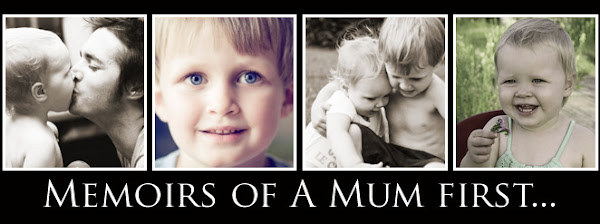Off I toddled today to the second instalment of the Triple P Parenting Course. Today’s session dealt with "Promoting Children’s Development". The theory being, that encouraging the behaviour you like in your child increases the chances of the behaviour happening again (information we all should know).
This is what I learnt today...
• Parents need to spend quality time with their children. It doesn’t have to be large chunks of time...just a few minutes frequently through out the day (in particular, time that is special to your child). Time that is special to your child will occur when your child approaches you to tell you something, ask a question or involve you in their activity. If you’re not busy make yourself available.
• Talk with you children. Share ideas and information with your child and show that you are interested in what your child has to say.
• Show physical affection. Affection doesn’t necessarily mean cuddles...it can be holding, touching, kissing, massaging and tickling. Affection in the first few years of a child’s life helps them form secure bonds with their parents and those around them.
• Praise your child. Adults like to receive praise; children are no different. When giving praise you need to:
- Be clear & specific
- Describe the behaviour you like
- Be enthusiastic/sincere
• Give your child attention. This can be through a smile, wink, pat on the back or just good old plain watching. These actions add to your praise and show a child how pleased you are with their behaviour. These are particularly good ways to give your child encouragement when praise is not an option (ie. you don’t want to embarrass them or they are too far away to praise).
• Set a good example. Children learn through watching others, so let them watch you! Set a good example and show a child how to behave. Do not expect your child to follow house rules if no one else in the family does.
• Use incidental teaching. When children approach you for information help or attention, they are often motivated and ready to learn. Just telling your child the answer to a question does not help them learn to think for themselves. Prompt your child to come up with the answer and see if you can help them learn more...for example, "what colour do you think it is?" . Incidental teaching promotes:
- Language
- Creative independent play
- General knowledge
- Problem solving skills
• Teach children to become independent. To teach children to become independent in various areas (like dressing, brushing teeth etc) you should follow these steps:
- Ask: Ask your child what the first step is in the activity
- Say: If your child doesn’t know tell them what to do
- Do: If you child doesn’t perform the task, help them. Stop helping once the task is started to let your child finish by themselves.
- Praise cooperation and success
- Repeat Ask Say, Do for each step.
• Use behaviour charts. A little extra motivation doesn’t go astray.
Today’s session proved interesting; well to me anyway. I was happy to know that I had been implementing many of the strategies to promote my child’s development in the correct way. By know means am I perfect...it is just nice to know that I am heading in the right direction.
I wonder what next weeks class will entail...
Wednesday, July 26, 2006
Promoting Children’s Development
Posted by
Nicole
at
9:40:00 PM
![]()
Subscribe to:
Post Comments (Atom)







No comments:
Post a Comment